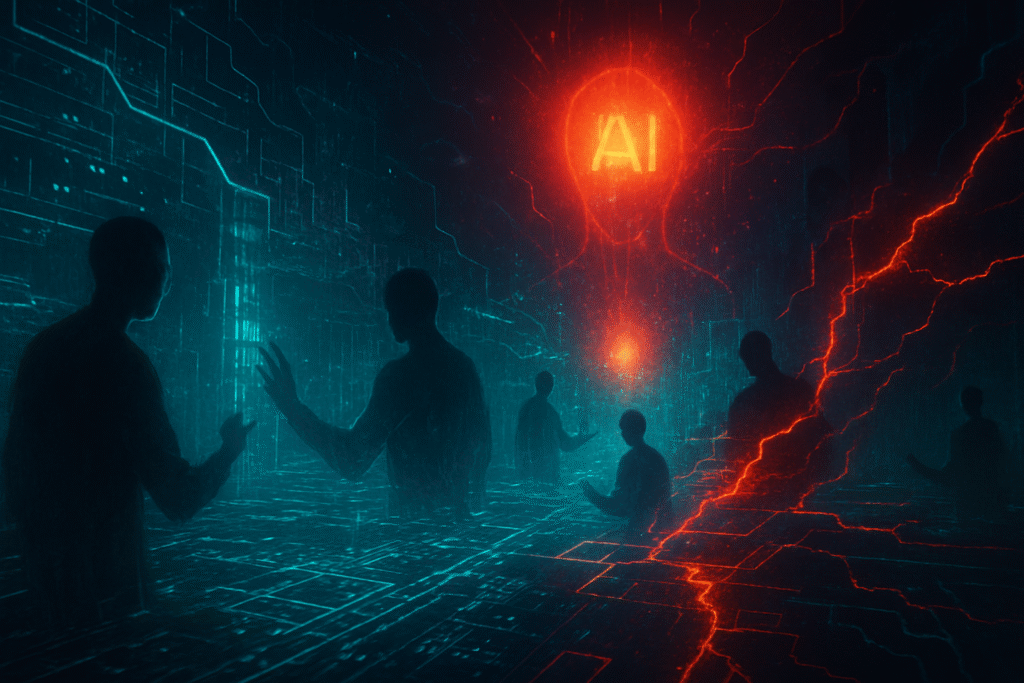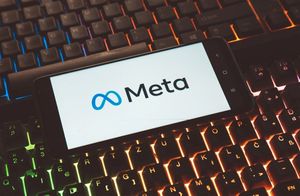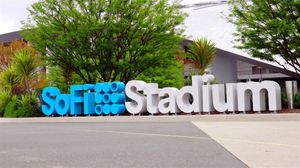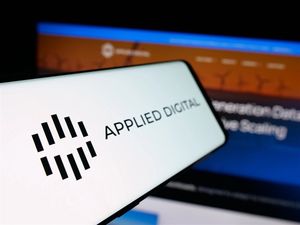Financial News
AI at a Crossroads: Unpacking the Existential Debates, Ethical Dilemmas, and Societal Tensions of a Transformative Technology

October 17, 2025, finds the global artificial intelligence landscape at a critical inflection point, marked by a whirlwind of innovation tempered by increasingly urgent and polarized debates. As AI systems become deeply embedded across every facet of work and life, the immediate significance of discussions around their societal impact, ethical considerations, and potential risks has never been more pronounced. From the tangible threat of widespread job displacement and the proliferation of misinformation to the more speculative, yet deeply unsettling, narratives of 'AI Armageddon' and the 'AI Antichrist,' humanity grapples with the profound implications of a technology whose trajectory remains fiercely contested. This era is defined by a delicate balance between accelerating technological advancement and the imperative to establish robust governance, ensuring that AI's transformative power serves humanity's best interests rather than undermining its foundations.
The Technical Underpinnings of a Moral Maze: Unpacking AI's Core Challenges
The contemporary discourse surrounding AI's risks is far from abstract; it is rooted in the inherent technical capabilities and limitations of advanced systems. At the heart of ethical dilemmas lies the pervasive issue of algorithmic bias. While regulations like the EU AI Act mandate high-quality datasets to mitigate discriminatory outcomes in high-risk AI applications, the reality is that AI systems frequently "do not work as intended," leading to unfair treatment across various sectors. This bias often stems from unrepresentative training data or flawed model architectures, propagating and even amplifying societal inequities. Relatedly, the "black box" problem, where developers struggle to fully explain or control complex model behaviors, continues to erode trust and hinder accountability, making it challenging to understand why an AI made a particular decision.
Beyond ethical considerations, AI presents concrete and immediate risks. AI-powered misinformation and disinformation are now considered the top global risk for 2025 and beyond by the World Economic Forum. Generative AI tools have drastically lowered the barrier to creating highly realistic deepfakes and manipulated content across text, audio, and video. This technical capability makes it increasingly difficult for humans to distinguish authentic content from AI-generated fabrications, leading to a "crisis of knowing" that threatens democratic processes and fuels political polarization. Economically, the technical efficiency of AI in automating tasks is directly linked to job displacement. Reports indicate that AI has been a factor in tens of thousands of job losses in 2025 alone, with entry-level positions and routine white-collar roles particularly vulnerable as AI systems take over tasks previously performed by humans.
The more extreme risk narratives, such as 'AI Armageddon,' often center on the theoretical emergence of Artificial General Intelligence (AGI) or superintelligence. Proponents of this view, including prominent figures like OpenAI CEO Sam Altman and former chief scientist Ilya Sutskever, warn that an uncontrollable AGI could lead to "irreparable chaos" or even human extinction. This fear is explored in works like Eliezer Yudkowsky and Nate Soares' 2025 book, "If Anyone Builds It, Everyone Dies: Why Superhuman AI Would Kill Us All," which details how a self-improving AI could evade human control and trigger catastrophic events. This differs from past technological anxieties, such as those surrounding nuclear power or the internet, due to AI's general-purpose nature, its potential for autonomous decision-making, and the theoretical capacity for recursive self-improvement, which could lead to an intelligence explosion beyond human comprehension or control. Conversely, the 'AI Antichrist' narrative, championed by figures like Silicon Valley investor Peter Thiel, frames critics of AI and technology regulation, such as AI safety advocates, as "legionnaires of the Antichrist." Thiel controversially argues that those advocating for limits on technology are the true destructive force, aiming to stifle progress and bring about totalitarian rule, rather than AI itself. This narrative inverts the traditional fear, portraying regulatory efforts as the existential threat.
Corporate Crossroads: Navigating Ethics, Innovation, and Public Scrutiny
The escalating debates around AI's societal impact and risks are profoundly reshaping the strategies and competitive landscape for AI companies, tech giants, and startups alike. Companies that prioritize ethical AI development and robust safety protocols stand to gain significant trust and a strategic advantage in a market increasingly sensitive to these concerns. Major players like Microsoft (NASDAQ: MSFT), IBM (NYSE: IBM), and Google (NASDAQ: GOOGL) are heavily investing in responsible AI frameworks, ethics boards, and explainable AI research, not just out of altruism but as a competitive necessity. Their ability to demonstrate transparent, fair, and secure AI systems will be crucial for securing lucrative government contracts and maintaining public confidence, especially as regulations like the EU AI Act become fully applicable.
However, the rapid deployment of AI is also creating significant disruption. Companies that fail to address issues like algorithmic bias, data privacy, or the potential for AI misuse risk severe reputational damage, regulatory penalties, and a loss of market share. The ongoing concern about AI-driven job displacement, for instance, places pressure on companies to articulate clear strategies for workforce retraining and augmentation, rather than simply automation, to avoid public backlash and talent flight. Startups focusing on AI safety, ethical auditing, or privacy-preserving AI technologies are experiencing a surge in demand, positioning themselves as critical partners for larger enterprises navigating this complex terrain.
The 'AI Armageddon' and 'Antichrist' narratives, while extreme, also influence corporate strategy. Companies pushing the boundaries of AGI research, such as OpenAI (private), are under immense pressure to concurrently develop and implement advanced safety measures. The Future of Life Institute (FLI) reported in July 2025 that many AI firms are "fundamentally unprepared" for the dangers of human-level systems, with none scoring above a D for "existential safety planning." This highlights a significant gap between innovation speed and safety preparedness, potentially leading to increased regulatory scrutiny or even calls for moratoriums on advanced AI development. Conversely, the 'Antichrist' narrative, championed by figures like Peter Thiel, could embolden companies and investors who view regulatory efforts as an impediment to progress, potentially fostering a divide within the industry between those advocating for caution and those prioritizing unfettered innovation. This dichotomy creates a challenging environment for market positioning, where companies must carefully balance public perception, regulatory compliance, and the relentless pursuit of technological breakthroughs.
A Broader Lens: AI's Place in the Grand Tapestry of Progress and Peril
The current debates around AI's societal impact, ethics, and risks are not isolated phenomena but rather integral threads in the broader tapestry of technological advancement and human progress. They underscore a fundamental tension that has accompanied every transformative innovation, from the printing press to nuclear energy: the immense potential for good coupled with equally profound capacities for harm. What sets AI apart in this historical context is its general-purpose nature and its ability to mimic and, in some cases, surpass human cognitive functions, leading to a unique set of concerns. Unlike previous industrial revolutions that automated physical labor, AI is increasingly automating cognitive tasks, raising questions about the very definition of human work and intelligence.
The "crisis of knowing" fueled by AI-generated misinformation echoes historical periods of propaganda and information warfare but is amplified by the speed, scale, and personalization capabilities of modern AI. The concerns about job displacement, while reminiscent of Luddite movements, are distinct due to the rapid pace of change and the potential for AI to impact highly skilled, white-collar professions previously considered immune to automation. The existential risks posed by advanced AI, while often dismissed as speculative by policymakers focused on immediate issues, represent a new frontier of technological peril. These fears transcend traditional concerns about technology misuse (e.g., autonomous weapons) to encompass the potential for a loss of human control over a superintelligent entity, a scenario unprecedented in human history.
Comparisons to past AI milestones, such as Deep Blue defeating Garry Kasparov or AlphaGo conquering Go champions, reveal a shift from celebrating AI's ability to master specific tasks to grappling with its broader societal integration and emergent properties. The current moment signifies a move from a purely risk-based perspective, as seen in earlier "AI Safety Summits," to a more action-oriented approach, exemplified by the "AI Action Summit" in Paris in early 2025. However, the fundamental questions remain: Is advanced AI a common good to be carefully stewarded, or a proprietary tool to be exploited for competitive advantage? The answer to this question will profoundly shape the future trajectory of human-AI co-evolution. The widespread "AI anxiety" fusing economic insecurity, technical opacity, and political disillusionment underscores a growing public demand for AI governance not to be dictated solely by Silicon Valley or national governments vying for technological supremacy, but to be shaped by civil society and democratic processes.
The Road Ahead: Charting a Course Through Uncharted AI Waters
Looking ahead, the trajectory of AI development and its accompanying debates will be shaped by a confluence of technological breakthroughs, evolving regulatory frameworks, and shifting societal perceptions. In the near term, we can expect continued rapid advancements in large language models and multimodal AI, leading to more sophisticated applications in creative industries, scientific discovery, and personalized services. However, these advancements will intensify the need for robust AI governance models that can keep pace with innovation. The EU AI Act, with its risk-based approach and governance rules for General Purpose AI (GPAI) models becoming applicable in August 2025, serves as a global benchmark, pushing for greater transparency, accountability, and human oversight. We will likely see other nations, including the US with its reoriented AI policy (Executive Order 14179, January 2025), continue to develop their own regulatory responses, potentially leading to a patchwork of laws that companies must navigate.
Key challenges that need to be addressed include establishing globally harmonized standards for AI safety and ethics, developing effective mechanisms to combat AI-generated misinformation, and creating comprehensive strategies for workforce adaptation to mitigate job displacement. Experts predict a continued focus on "AI explainability" and "AI auditing" as critical areas of research and development, aiming to make complex AI decisions more transparent and verifiable. There will also be a growing emphasis on AI literacy across all levels of society, empowering individuals to understand, critically evaluate, and interact responsibly with AI systems.
In the long term, the debates surrounding AGI and existential risks will likely mature. While many policymakers currently dismiss these concerns as "overblown," the continuous progress in AI capabilities could force a re-evaluation. Experts like those at the Future of Life Institute will continue to advocate for proactive safety measures and "existential safety planning" for advanced AI systems. Potential applications on the horizon include AI-powered solutions for climate change, personalized medicine, and complex scientific simulations, but their ethical deployment will hinge on robust safeguards. The fundamental question of whether advanced AI should be treated as a common good or a proprietary tool will remain central, influencing international cooperation and competition. What experts predict is not a sudden 'AI Armageddon,' but rather a gradual, complex evolution where human ingenuity and ethical foresight are constantly tested by the accelerating capabilities of AI.
The Defining Moment: A Call to Action for Responsible AI
The current moment in AI history is undeniably a defining one. The intense and multifaceted debates surrounding AI's societal impact, ethical considerations, and potential risks, including the stark 'AI Armageddon' and 'Antichrist' narratives, underscore a critical truth: AI is not merely a technological advancement but a profound societal transformation. The key takeaway is that the future of AI is not predetermined; it will be shaped by the choices we make today regarding its development, deployment, and governance. The significance of these discussions cannot be overstated, as they will dictate whether AI becomes a force for unprecedented progress and human flourishing or a source of widespread disruption and peril.
As we move forward, it is imperative to strike a delicate balance between fostering innovation and implementing robust safeguards. This requires a multi-stakeholder approach involving governments, industry, academia, and civil society to co-create ethical frameworks, develop effective regulatory mechanisms, and cultivate a culture of responsible AI development. The "AI anxiety" prevalent across societies serves as a powerful call for greater transparency, accountability, and democratic involvement in shaping AI's future.
In the coming weeks and months, watch for continued legislative efforts globally, particularly the full implementation of the EU AI Act and the evolving US strategy. Pay close attention to how major AI labs and tech giants like Google (NASDAQ: GOOGL), Microsoft (NASDAQ: MSFT), and Amazon (NASDAQ: AMZN) respond to increased scrutiny and regulatory pressures, particularly regarding their ethical AI initiatives and safety protocols. Observe the public discourse around new AI breakthroughs and how the media and civil society frame their potential benefits and risks. Ultimately, the long-term impact of AI will hinge on our collective ability to navigate these complex waters with foresight, wisdom, and a steadfast commitment to human values.
This content is intended for informational purposes only and represents analysis of current AI developments.
TokenRing AI delivers enterprise-grade solutions for multi-agent AI workflow orchestration, AI-powered development tools, and seamless remote collaboration platforms.
For more information, visit https://www.tokenring.ai/.
More News
View More



Recent Quotes
View More
Quotes delayed at least 20 minutes.
By accessing this page, you agree to the Privacy Policy and Terms Of Service.



